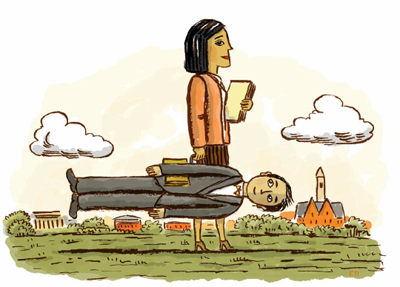Cornell tackles the 'two-body problem' in faculty hiring
Cornell tackles the 'two-body problem' in faculty hiring
Every new mom acquires a wealth of skills as she adapts to parenthood. For Liz Karns, that included tending to her infant daughter on transcontinental flights to and from London, where Karns's husband, Tad Brennan, was on the philosophy faculty at King's College. "Her nursery was American Airlines," says Karns, a lawyer and public health statistician who at the time lived in Wilmington, Delaware, where she had founded a company to conduct epidemiological studies for chemical companies.
Together for twenty-five years, the couple has been "doing dual-careerish things the whole time," as Karns puts it. Sixteen years ago that meant raising a young family—and pursuing careers—on two continents. By 2005, both Karns and Brennan had found rewarding work in Chicago. So when Cornell's Sage School of Philosophy recruited Brennan to its faculty in 2007, the couple thought long and hard about whether to make the move to Ithaca.
In physics, the challenge of anticipating the motion of a moon orbiting a planet or an electron whizzing around the nucleus of an atom is known as the "two-body problem." On campuses across the country, the term is increasingly deployed to describe the challenge couples face in seeking satisfying jobs when one partner—or both—works in academia. In a 2008 study, the Clayman Institute for Gender Research at Stanford found that 72 percent of full-time faculty have working partners; in half of those couples, both are academics. "Universities are in danger of losing prized candidates if suitable employment cannot be found for a partner," the authors write. "A full 88 percent of faculty who successfully negotiated a dual hire at their current institution indicated that the first hire would have refused the position had her or his partner not found appropriate employment. Slightly more than 20 percent also report that they or their partner have taken a job at a less prestigious institution to improve the couple's overall employment situation."
 No one knows exactly how many dual-career couples there are at Cornell. Ecology and evolutionary biology chairman Nelson Hairston served from 2006 to 2009 as senior associate dean for the College of Arts and Sciences. During that time, he says, at least 25 percent of his workload involved the two-body problem. "Whether trying to get them to come here or trying to keep them here," he says, "it's a huge effort in Ithaca, where there aren't a lot of options for spouses."
No one knows exactly how many dual-career couples there are at Cornell. Ecology and evolutionary biology chairman Nelson Hairston served from 2006 to 2009 as senior associate dean for the College of Arts and Sciences. During that time, he says, at least 25 percent of his workload involved the two-body problem. "Whether trying to get them to come here or trying to keep them here," he says, "it's a huge effort in Ithaca, where there aren't a lot of options for spouses."
In 2001, Cornell's Office of Human Resources hired Betsy Hillman to serve as the University's full-time dual-career consultant, the first post of its kind in the Ivy League. Hillman provides résumé assistance, furnishes local networking contacts, and offers general job-search support for partners of faculty and top-tier administrators. "It's not something where I give people some websites and say, 'Let me know when you find a job,' " she says. "I sometimes talk of my work as 'job search partner,' or [describe the process as] 'managed serendipity.' I can't do it for them or provide the serendipity, but I can provide the management."
Each year roughly sixty people contact her for assistance. When the University publishes its annual list of new faculty, Hillman recognizes about 55 percent of the names. "The 45 percent I don't know may be single," she says, "or they may have a partner who found a job on their own, is staying home with family, or is also on the faculty but has a different last name and negotiated the appointment without contacting me."
Associate professors Jennifer Thaler and Anurag Agrawal fall into the latter category. The chemical ecologists met on their first day of graduate school at the University of California, Davis, in 1994 and after doing postdocs there and in the Netherlands landed assistant professorships at the University of Toronto. Hairston, who describes the pair as "superb scientists," invited them to apply to his department. "The challenge when you've identified someone you really want and they have a spouse who's excellent, too, is that you have to find the funds for a second position and a department that's appropriate," he says." Getting all the pieces together can be challenging—especially when you're not only trying to line up things at Cornell, but do it quickly enough that they don't get snapped up by some other university."
Karns, who was transitioning from a career as a lawyer in private practice, says having Hillman's support through the job search process made a huge difference. She ultimately accepted a post as a lecturer in Industrial and Labor Relations, where she started out teaching introductory statistics. She now also offers a sophomore writing seminar on statistical applications in law and public policy as well as a course on occupational epidemiology. "Tad and I were clear that we wouldn't move unless we both had an offer," she says. "Ithaca is the kind of town where if you come without a job in your field, it's really hard to get one."
— Sharon Tregaskis '95


